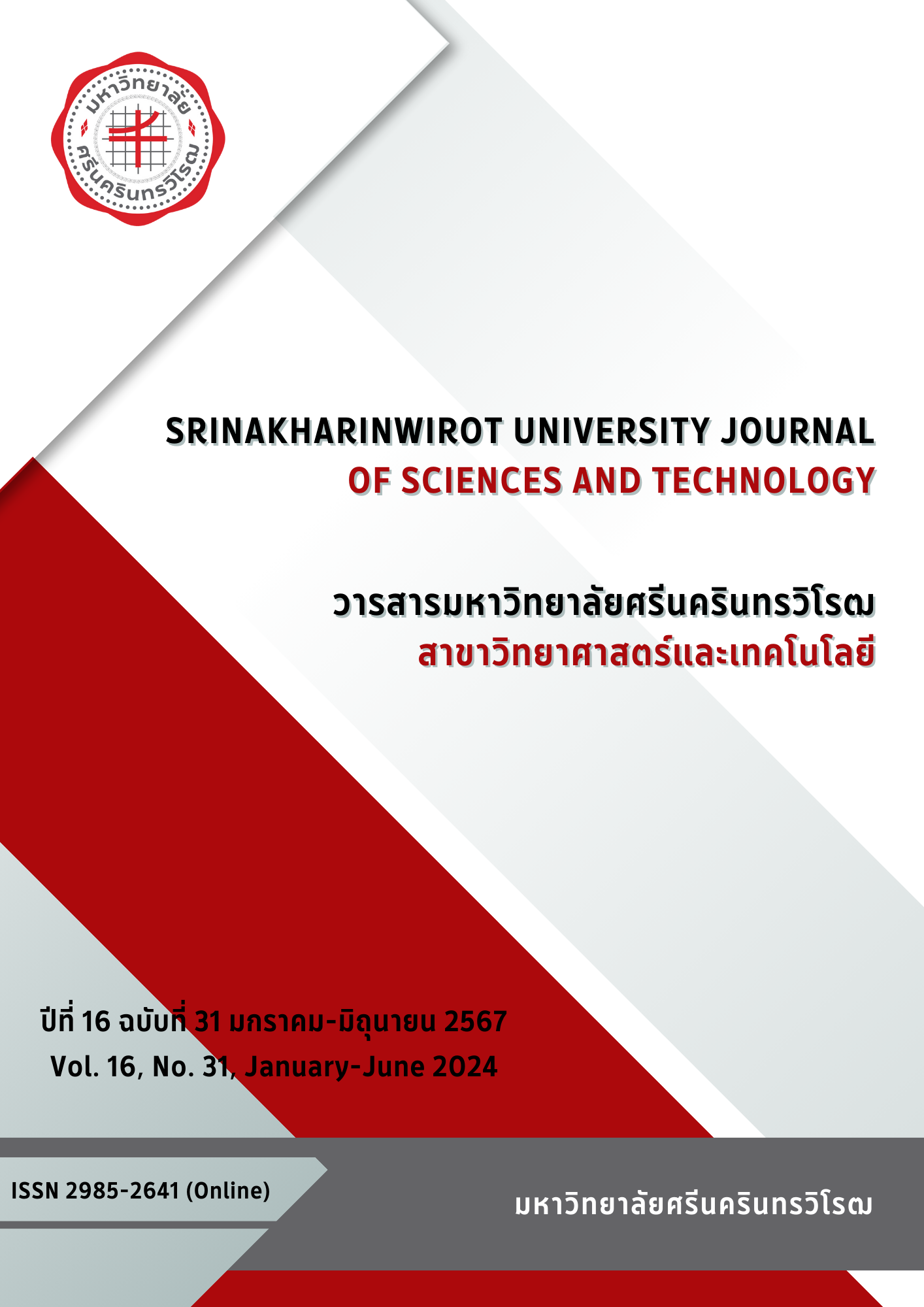PREDICTION OF ANTHRACNOSE DISEASE SPREAD AREAS AND PRODUCTIVITY OF ARABICA COFFEE USING SATELLITE IMAGERY
Keywords:
Satellite Imagery, Arabica coffee, Anthracnose disease spread areas, Productivity PredictionAbstract
Currently, there are technological surveys that recognize remote applications as diverse, particularly satellite technology that analyzes spatial data on Earth from space. This technology facilitates rational spatial decision analysis, saving time before surveys. The purpose of this study is to investigate and analyze the factors that contribute to the occurrence of Anthracnose disease in Arabica coffee and predict the productivity of Arabica coffee during an outbreak of Anthracnose disease in the Doi Chang area of Wawee sub-district, Mae Sui district, Chiang Rai province. The study found that the factors influencing the occurrence of Anthracnose disease are Land Surface Temperature (LST), Elevation, and Normalized Difference Moisture Index (NDMI), with a model accuracy of 95.4 percent. Factors such as leaf area index (LAI) and Normalized Difference Moisture Index (NDMI) are relevant regarding the Productivity Prediction of Arabica coffee. The R-square value is 0.594, and the Mean Square Error is 76.31 Kg per Rai. This study presents an alternative option for preparing risk management strategies to mitigate the impact of plant diseases on Arabica coffee and evaluating coffee productivity before entering the market in the future.
Downloads
References
Tummakate, A. (1985). Arabica Coffee Varieties in Thailand. Thai Agricultural Research Journal, 128-136.
Office of Agricultural Economics. (2021). Coffee table. Retrieved January 2, 2021, from https://www.oae.go.th/view
Bunruan, W., and Doherty, W. (2021). The Communication Process of Leader for Business Management for Communities to Sustainable Development: Cast study doi chang coffee. National Postgraduate Student Colloquium.
Sangpueak, R. (2014). Identification of Cassava Anthracnose. Suranaree University.
Isarasenee, A. (2013). Harvesting and processing of coffee beans. Retrieved December 1, 2022, from https://www.thaikasetsart.com
Bhasabutra, T., Jeamchaisri, Y., Somrit, A., Lertwatthanakiat, S., and Khomarwut, C. (2017). Anthracnose Disease of Arabica Coffee in Thailand. Chiang Mai Royal Agricultural Research Center.
Hawaii's Cooperative Extension fosters educational programs. (2017). Anthracnose. Retrieved December 2, 2022, from https://www.hawaiicoffeeed.com/anthracnose.html
The U.S. Geological Survey. (n.d.). What is remote sensing and what is it used for? Retrieved December 1, 2022, from https://www.usgs.gov/faqs/what-remote-sensing-and-what-it-used
Vilela, E. F., Ferreira, M. P., Castro, M. G., Faria, R. A., Leite, H. D., Lima, A. I., Matos, M. C., Silva, A. R., and Venzon, M. (2023). New Spectral Index and Machine Learning Models for Detecting Coffee Leaf Miner Infestation Using Sentinel-2 Multispectral Imagery. Agriculture,13(2), Article number 388.
NASA's Earth Science Data Systems. (2021). ASF Data Search Vertex. Retrieved November 1, 2021, from https://search.asf.alaska.edu
National Hydroinformatics Data Center. (2012). Weather Tracking: Rainfall monthly data. Retrieved December 14, 2022, from https://www.thaiwater.net/weather/rainfall
Peainlert, S., Tongdeenok, P., and Kaewjampa, N. (2018). Drought Risk Area Assessment Using Remotely Sensed Data and Meteorological Data in Chern Sub-watershed. KKU Research Journal, 18(3), 67-83.
Abdelraouf, M. A., Igor, S., Anton, P., Mohamed, A., Nasser, S., Khaled, A., Mohammed, E. S., and Peter, D. (2021). Integrated method for rice cultivation monitoring using Sentinel-2 data and Leaf Area Index. Egyptian Journal of Remote Sensing and Space Sciences, 24(3), 431-441.
Earth Observing System. (2019). Vegetation Indices to Drive Digital Agri Solutions. Retrieved December 12, 2022, from https://eos.com/blog/6-spectral-indexes-on-top-of-ndvi-to-make-your-vegetation-analysis-complete
Oleksandra, S. (2022). Evaluation and Correlation of Sentinel-2 NDVI and NDMI. Journal of Ecological Engineering, 23(9), 212-218.
Charoenhirunyingyos, S. (2018). Best Correlation between Vegetation Indices and Fresh Fruit Bunch of Oil Palm Yield Derived from LANDSAT 8. Journal of Social Sciences Srinakharinwirot University, 21, 235-247.
Jung, M. C., Dyson, K., and Alberti, M. (2021). Urban Landscape Heterogeneity Influences the Relationship between Tree Canopy and Land Surface Temperature. Urban Forestry & Urban Greening, 57. Article number 126930. https://doi.org/10.1016/j.ufug.2020.126930
Phisailert, A. (2006). Thailand Patent No. 50100018. n.p.
Sukpinit, J., Hemwan, P., and Charoenpanyanet, A. (2022). Landslide Susceptibility Assessment Using Frequency Ratio Method: A Case study in Sakad village, Sakad Subdistrict, Pua District, Nan Province. Burapha Science Journal, 27(3), 1832-1851.
Reche, I., D'Orta, G., Mladenov, N., Winget, D. M., and Suttle, C. A. (2018). Deposition rates of viruses and bacteria above the atmospheric boundary layer. ISME Journal, 12(4), 1154-1162.
Kaiyawan, Y. (2012). Principle and Using Logistic Regression Analysis for Research. RMUTSV Research Journal, 4(1), 1-12.
Phonarth, M. (2015). Statistic in Research. War Veterans Organization Officer of Printing.
Sheiner, L. B., and Beal, S. L. (1981). Some suggestions for measuring predictive performance. Journal of Pharmacokinetics and Biopharmaceutics, 9(4), 503-512. https://doi.org/10.1007/bf01060893
Trikarunasawat, C., Karunsatitchai, A., and Koslanund, R. (2021). The Studies of Evaluation Method on Antracnose Disease Infection in Postharvest Fruits by Quiescent Infection Inspection. Postharvest and Processing Research and Development Division.
Tunpaiboon, P. (2022). Know Coffee. Retrieved from https://doithaicoffee.com/906
Lymburner, L., Beggs, P. J., and Jacobson, C. R. (2000). Estimation of canopy-average surface-specific leaf area using Landsat TM data. Photogrammetric Engineering and Remote Sensing, 66(2), 183-191.
Agricultural Research Development Agency (Public Orgranization). (2003). The environmental suitable for Arabica coffee planting. Retrieved December 12, 2022, from https://www.arda.or.th/kasetinfo/south/coffee/controller/01-03.php
Downloads
Published
How to Cite
Issue
Section
License
Copyright (c) 2024 Srinakharinwirot University Journal of Sciences and Technology

This work is licensed under a Creative Commons Attribution-NonCommercial-NoDerivatives 4.0 International License.
Srinakharinwirot University Journal of Sciences and Technology is licensed Under a Creative Commons Attribution-NonCommercial-NoDerivs 4.0 International (CC-BY-NC-ND 4.0) License, Unless Otherwise Stated. Please Read Journal Policies Page for More Information on Open Access, Copyright and Permissions.



